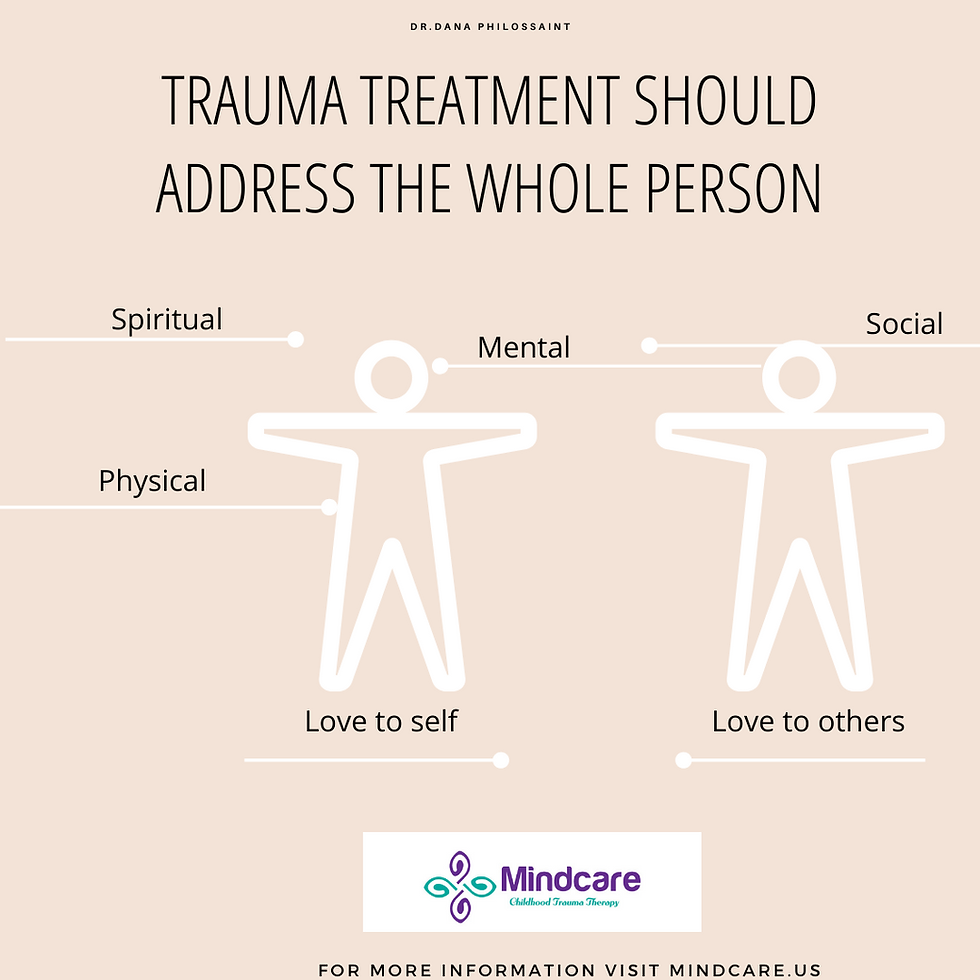The number #1 important thing to keep in mind when seeking therapy for dealing with childhood trauma
- Dr. Philossaint

- Oct 23, 2020
- 4 min read
Updated: May 16, 2021
Mental health therapy used to have a bad stigma. Has that changed?
According to a survey completed by the American Psychological Association (APA) in 2014, nearly half of American households have had someone seek mental health treatment. A telephone survey of 1,000 randomly selected Americans between the ages of 18 and 64 also shows that stigma about seeking mental health treatment is increasingly less of an obstacle to getting treatment. Forty-eight percent of those polled reported a visit to a mental health professional by someone in their household, and 91 percent said they would likely consult or recommend a mental health professional if they or a family member were experiencing a problem. We know that more Americans are seeking mental health treatment. Therefore, individuals seeking mental health assistance must understand what counseling is useful and what counseling practices to avoid.
Why are therapists approaches to trauma so different?
Many mental health care providers utilize the term therapist. The term ‘therapist’ covers everything from licensed clinical social workers to family counselors, licensed professional counselors, counselors, clinical psychologists, and psychiatrists. Typically, these individuals are not all trained in the same way, same knowledge, the same practices, or beliefs. As such, their treatment protocols are also different.
According to the Trauma Institute & Child Trauma Institute, therapists utilize different modalities to treat trauma; anything from Prolonged Exposure, Cognitive Processing Therapy, Trauma-Focused Cognitive-Behavioral Therapy, Narrative Exposure Therapy, Eye Movement Desensitization & Reprocessing, and Counting Method. Sadly, very few utilize a whole-person approach to help people with their mental, physical, and spiritual state. Research conducted by Dr. Van der Kolk indicates that not every provider addresses the WHOLE person. In his book, The Body Keeps the Score: Brain, Mind, and Body in the Healing of Trauma, Dr. Van der Kolk M.D., gives compelling evidence for health care providers to provide a holistic approach to address trauma. He also agrees that talk therapy does not produce lasting or promising results for trauma.
In your opinion, what is the best approach to help with trauma?
Therapy is most effective when it incorporates physical, mental, social, and spiritual practices. When therapists consider ways to help trauma victims with lifestyle changes and improvement, they will see more significant individuals’ make progress. One of the most incredible benefits of therapy is that they can provide many people with encouragement, instruction, and hope when they need it the most. Dr. Cecilia Chan, Social work professor from the University of Hong Kong, explains trauma as follows “the Chinese word for “trauma” (chuangshang) is the juxtaposition of two characters: “creation” (chuang) and “hurt” (shang). Based on the Chinese meaning of the word trauma, Dr. Chan states that traumatic experiences can create growth opportunities by introducing fresh perspectives to one’s life. Specifically, a person can learn how to overcome trauma by addressing the things they can control in their physical, emotional, social, and spiritual lives. A body-Mind-Spirit Approach must be used to assist individuals in thriving after significant trauma.
The best approach to address trauma includes a treatment system that empowers and encourages individuals to change their traumatic brain by improving your lifestyle, physically, mentally, socially, and spiritually. Every person is different, and every mental health condition demands slightly different treatment. However, a whole-person lifestyle approach can often help you combat negative thoughts created from trauma. Dr. Chan article entitled, The Strength-Focused and Meaning-Oriented Approach to Resilience and Transformation (SMART): A Body-Mind-Spirit Approach to Trauma Management, identifies six aspects that should be promoted in helping those with trauma:
1. Emphasizing growth through pain.
2. Teaching the mind-body-spirit connection.
3. Developing an appreciation of nature.
4. Facilitating cognitive re-appraisal.
5. Nourishing social support.
6. Promoting the compassionate helper principle.
If someone is seeking treatment for their trauma, what should they have in mind about therapy?
Counseling and therapy are not “brain magic.” There’s nothing your therapist can say that will mysteriously re-scramble things in your brain, immediately making your life better. Instead, therapy is hard work. It should be approached with wisdom and prayer. If you seek treatment to overcome trauma, keep in mind that counseling and mental health therapy can help. To experience the best support, choose individuals that incorporate whole-person lifestyles strategies to help you improve mentally, physically, and spiritually. A holistic approach will help you to thrive after difficult life experiences. If treatment does not address the whole person, it may provide some temporary relief, but the improvement will not last long.
For more information email: talk@mindcare.us or call: 678-632-5152.
References:
Chamberlin, J. (2004, July/August). Survey says: More Americans are seeking mental health treatment. Retrieved February 11, 2019, from https://www.apa.org/monitor/julaug04/survey
Chan, C. L. W., Chan, T. H. Y., & Ng, S. M. (2006). The Strength-Focused and Meaning-Oriented Approach to Resilience and Transformation (SMART). Social Work in Health Care, 43(2–3), 9–36. https://doi.org/10.1300/j010v43n02_03
Kolk, V. B. (2015). The Body Keeps the Score: Brain, Mind, and Body in the Healing of Trauma (Illustrated ed.). Penguin Books.
Trauma Institute & Child Trauma Institute. (2020). Trauma Therapies: Trauma Institute & Child Trauma Institute. Https://Www.Trauma.Info/Treatment/Trauma-Therapies. https://www.trauma.info/treatment/trauma-therapies


More information can be heard on this topic on our YouTube page.






Comments